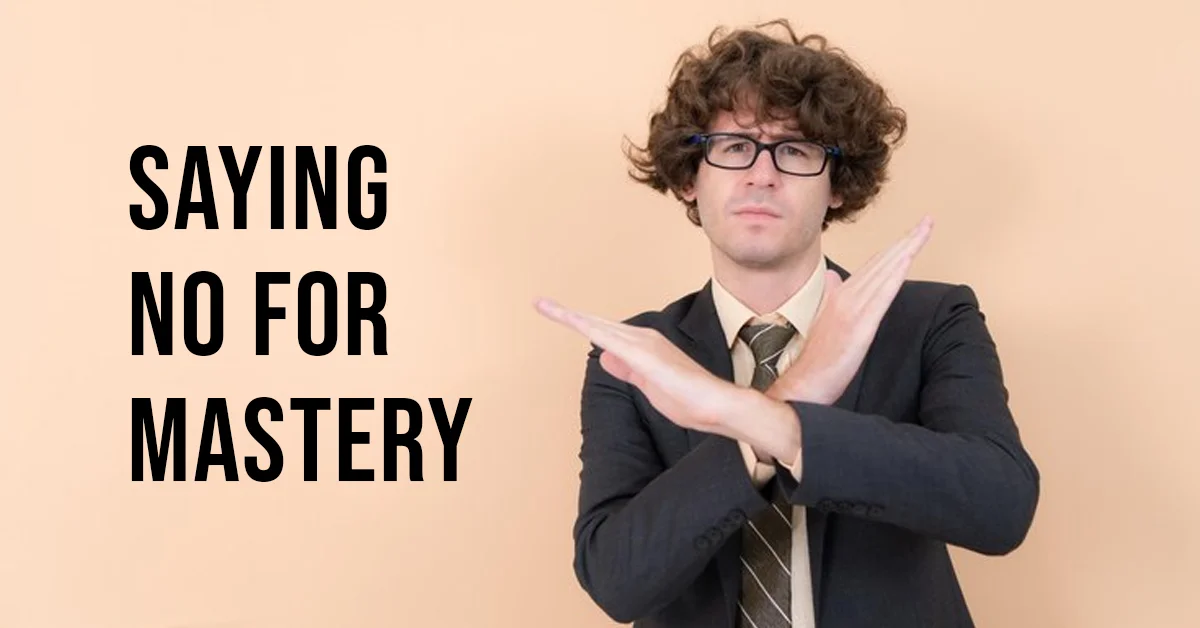In a world constantly demanding more of our time, energy, and attention, learning the art of saying “no” has become an essential skill for personal empowerment and Saying No For Mastery. Whether it’s a work commitment, a social obligation, or a favor asked by a friend or family member, knowing when and how to set boundaries can help preserve your energy, improve your focus, and ultimately lead you to a more fulfilling and purposeful life.
This article explores the significance of saying no, how it empowers you to take control of your life, and why it is crucial for mastering your personal and professional growth. We’ll also delve into strategies on how to say no effectively and why it’s okay to prioritize your well-being over pleasing others.
ALSO READ: Palestine Sonnet Poem: A Tribute To Struggle And Hope
The Power Of Saying No
At its core, the act of saying no is about setting boundaries. Boundaries are vital for maintaining emotional, mental, and physical health. They define what you’re willing to accept and what you’re not. Many people fear saying no because they don’t want to disappoint others or face confrontation. However, failing to set boundaries can lead to burnout, resentment, and stress.
Mastery over your own life requires a conscious effort to protect your time and energy. Saying no is a form of self-respect and self-care. It allows you to prioritize what truly matters and make space for things that align with your goals and values.
Saying No as a Tool for Focus
In an age where distractions are everywhere, the ability to say no is integral to maintaining focus. Without this skill, it’s easy to become overwhelmed by the multitude of tasks, requests, and opportunities that come your way. By learning to say no, you free up time to dedicate to the pursuits that align with your long-term vision.
Consider the following example: If you’re working on a project that requires deep concentration and a deadline is approaching, saying no to social gatherings or additional work commitments allows you to keep your focus sharp. This not only improves the quality of your output but also helps you manage stress and avoid multitasking, which can hinder productivity.
Saying No and Emotional Health
When you say yes to every request or obligation, it often leads to emotional exhaustion. You may feel overburdened, resentful, or even guilty for not being able to give your best to every person or task. By saying no, you’re protecting your emotional health, ensuring that you can engage with others in a way that is authentic and positive.
One key element of emotional well-being is recognizing that your feelings matter. If you agree to things out of obligation or guilt, it can create a sense of inner conflict. Saying no, on the other hand, allows you to honor your feelings, values, and priorities. It’s a simple yet effective way to maintain emotional equilibrium and ensure that you don’t compromise your mental health.
How Saying No Leads To Personal Empowerment
Personal empowerment is about taking charge of your own life, making decisions based on your values, and stepping into your full potential. Saying no is a direct path to personal empowerment because it places you in the driver’s seat of your life.
Assertiveness and Confidence
Mastery over the art of saying no requires assertiveness — the ability to express your needs, desires, and limits clearly and confidently. This level of assertiveness fosters self-respect and builds confidence. When you say no without guilt or hesitation, you’re actively exercising your autonomy and making choices that are aligned with your personal vision.
A confident person doesn’t fear letting others down because they understand that their own goals and well-being are just as important as those of others. By practicing this, you train yourself to make empowered decisions that are in your best interest.
Setting Priorities
In any given moment, you have a limited amount of time and energy. Saying no helps you set clear priorities and focus on what truly matters. For example, if you say no to a work project that doesn’t align with your career goals, you’re making room for an opportunity that might move you closer to your desired outcome. When you’re constantly saying yes to things that don’t serve you, you end up spreading yourself too thin and diminishing your effectiveness.
By learning to prioritize, you become more intentional with your time. You can choose to invest in activities that promote your growth, health, and happiness.
Building Resilience
Saying no also builds resilience, as it teaches you to face discomfort. Turning someone down might lead to temporary discomfort, but this discomfort is far outweighed by the long-term benefits of staying true to yourself. Over time, you’ll develop the mental and emotional strength to navigate challenges without sacrificing your core values.
Establishing Healthy Relationships
When you say no with respect and clarity, you also foster healthy relationships with others. People will come to understand your boundaries and will respect your decisions. Healthy relationships are built on mutual respect, and part of that is acknowledging that no one can meet every need all the time.
It’s essential to realize that saying no doesn’t mean rejecting someone or something; it simply means choosing what aligns best with your life and values at that moment. This promotes authenticity and helps you build trust and respect with others.
How To Say No Effectively
While saying no is empowering, it’s not always easy. If you’re someone who struggles with turning down requests, here are some strategies to help you say no more confidently and gracefully.
Be Direct, but Polite
Being straightforward is often the best approach. You don’t need to over-explain or justify your decision. A simple “I’m unable to commit at this time” or “I need to focus on my current priorities” is sufficient. Being clear and polite ensures you communicate your boundary without leaving room for ambiguity or unnecessary guilt.
Use the “Yes, And” Technique
If you feel uncomfortable saying no outright, you can use the “Yes, and” approach. This method involves acknowledging the request and offering an alternative solution. For instance, “Yes, I understand the importance of this project, and unfortunately, I don’t have the bandwidth right now. Would it be possible to revisit this in a few weeks?” This keeps the conversation open without overextending yourself.
Practice Saying No
Saying no can be challenging if you’re not used to it. Practice saying no in less emotionally charged situations to build your confidence. For instance, you can start by saying no to a minor request, like a social invitation when you know you need time for yourself. As you practice, you’ll become more comfortable with standing firm in your decisions.
Focus on Your Well-being
It’s important to remind yourself that your well-being matters. Saying no to something doesn’t make you a bad person; it makes you someone who values their mental, emotional, and physical health. The more you internalize this mindset, the easier it will be to make decisions that benefit you in the long run.
Don’t Feel the Need to Explain Yourself
You don’t owe anyone an explanation for your decision. While it’s natural to want to explain why you’re saying no, remember that it’s your choice, and it doesn’t require validation. Politely decline and leave it at that. People who respect you will understand.
Conclusion
Mastering the art of saying no is a powerful tool for personal empowerment. It helps you prioritize what truly matters, protects your emotional and mental well-being, and fosters healthier relationships. The ability to say no allows you to maintain focus on your goals, build resilience, and navigate life with confidence and clarity.
While it might be uncomfortable at first, saying no is a skill that can be developed with practice. It’s not about rejecting others, but about honoring your own needs and desires. By setting boundaries and being assertive, you take control of your life and step into your full potential.
Remember: you are the architect of your life, and learning to say no is one of the most important steps you can take toward mastering it.
ALSO READ: Understanding The Archetype For Moving South In Literature
FAQs
What is the importance of saying no for personal empowerment?
Saying no is crucial for personal empowerment because it allows you to set boundaries, prioritize your time and energy, and make decisions that align with your values and goals. It helps protect your well-being and ensures that you stay focused on what truly matters.
How can saying no improve my emotional health?
Saying no helps you avoid overcommitting, reducing stress and burnout. It also prevents feelings of resentment or guilt that can arise from agreeing to things you don’t want to do. By honoring your own limits, you maintain emotional balance and self-respect.
What are some effective ways to say no without feeling guilty?
To say no effectively, be direct yet polite, use the “Yes, and” technique to offer alternatives, and practice in lower-stakes situations. Focus on the benefits of saying no for your well-being, and remember that it’s okay to prioritize your needs.
How does saying no contribute to focus and productivity?
By saying no to distractions and commitments that don’t align with your goals, you can dedicate more time and energy to the tasks that matter most. This improves your focus, reduces multitasking, and enhances overall productivity.
Will saying no negatively affect my relationships with others?
When done respectfully and clearly, saying no can strengthen relationships by fostering mutual understanding and respect. People who value you will appreciate your honesty and boundaries, and it will help maintain healthier, more authentic connections.










